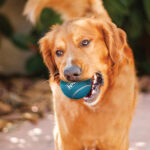
Just as with humans, good oral hygiene is essential for a dog’s overall health and well-being. Unfortunately, dental care often takes a back seat when it comes to pet care routines. In this comprehensive guide, we’ll walk you through the key steps to ensure your dog’s teeth stay healthy, common dental issues to watch out for, and recommended products to make the process easier.
Why Dental Care is Important for Dogs
Healthy teeth and gums are crucial for your dog’s quality of life. Poor dental hygiene can lead to pain, difficulty eating, and even systemic issues affecting the heart, liver, and kidneys. By maintaining a regular dental care routine, you can help your dog live a longer, healthier life.
Key Steps in Caring for Your Dog’s Teeth
1. Brush Regularly
Regular brushing is the most effective way to maintain your dog’s oral health. Here’s how to do it:
- Choose a Canine Toothbrush and Toothpaste: Human toothpaste can be harmful to dogs. Always use toothpaste specifically formulated for canines, which is safe to swallow and often flavored to appeal to pets.
- Start Slow: If your dog is new to tooth brushing, start by letting them lick the toothpaste off your finger. Gradually introduce the toothbrush, allowing them to get used to the sensation.
- Brush Gently: Lift your dog’s lips and brush in a circular motion, focusing on the gum line where plaque and tartar tend to accumulate. Aim to brush for about 2 minutes.
- Frequency: Ideally, you should brush your dog’s teeth daily. However, even a few times a week can make a significant difference.
2. Provide Dental Chews and Toys
Dental chews and toys are an excellent supplement to brushing. They help reduce plaque and tartar buildup while keeping your dog entertained.
- Dental Chews: Look for chews that are specifically designed to promote oral health. Products like Greenies or Dentastix are popular choices.
- Dental Toys: Choose toys with ridges and textures that clean teeth and massage gums as your dog chews. Brands like Nylabone and Kong offer various options.
3. Schedule Annual Dental Check-ups
Regular veterinary check-ups are crucial for maintaining your dog’s dental health.
- Professional Cleanings: Your vet can perform thorough cleanings that reach areas you might miss during home care.
- Early Detection: Regular check-ups allow your vet to catch dental issues early before they become severe.
- Tailored Advice: Your vet can provide personalized recommendations based on your dog’s specific needs and dental health status.
4. Feed a Healthy Diet
A balanced diet supports not only your dog’s overall health but also their dental health.
- Quality Food: Choose high-quality dog food that promotes oral health. Some brands offer dental-specific formulas that help reduce plaque and tartar.
- Raw Bones: Raw bones (never cooked) can be beneficial for dental health. However, consult your vet before introducing bones to avoid any risks.
5. Monitor Your Dog’s Dental Health
Regularly check your dog’s mouth for signs of dental issues:
- Bad Breath: Persistent bad breath can indicate dental problems.
- Discolored Teeth: Yellow or brown teeth suggest plaque and tartar buildup.
- Red or Swollen Gums: These can be signs of gingivitis or periodontal disease.
- Loose or Broken Teeth: Broken or loose teeth can be painful and lead to more severe issues.
- Behavioral Changes: Reluctance to eat, play with chew toys, or noticeable pain around the mouth may signal dental problems.
Common Dental Issues in Dogs
Understanding common dental issues can help you take preventive measures and seek timely veterinary care.
1. Plaque and Tartar Buildup
- Cause: Plaque forms when food particles and bacteria accumulate on the teeth. If not removed, it hardens into tartar.
- Consequences: Leads to gingivitis and periodontal disease.
- Prevention: Regular brushing and dental chews.
2. Broken or Fractured Teeth
- Cause: Often results from chewing on hard objects, trauma, or accidents.
- Consequences: Can be painful and lead to infections.
- Treatment: Veterinary care to assess the damage and determine the best course of action.
3. Abscesses
- Cause: Typically due to untreated periodontal disease or broken teeth.
- Consequences: Painful and can lead to serious infections.
- Treatment: Requires veterinary intervention, often involving drainage and antibiotics.
4. Malocclusion (Misalignment of Teeth)
- Cause: Genetic factors or developmental issues.
- Consequences: Abnormal wear on teeth, difficulty eating, and potential tooth loss.
- Treatment: Varies depending on severity; consult your vet for options.
5. Oral Tumors and Cysts
- Cause: Can be benign or malignant, with various underlying factors.
- Consequences: Affects chewing, swallowing, and overall oral health.
- Treatment: Requires veterinary diagnosis and appropriate treatment, which may include surgery.
Recommended Dental Care Products for Dogs
To make dental care easier, here are some products that we recommend:
- Canine Toothbrush: Look for brushes with soft bristles and an ergonomic design for easy handling.
- Enzymatic Toothpaste: These toothpastes contain enzymes that help break down plaque and are safe for dogs to swallow.
- Dental Chews: Products like Greenies or Dentastix that are specifically designed to promote oral health.
- Dental Toys: Chew toys with textures that help clean teeth and massage gums.
Conclusion
Caring for your dog’s teeth is crucial for their overall health and well-being. By following the steps outlined in this guide—brushing regularly, using dental chews, scheduling annual check-ups, feeding a healthy diet, and monitoring their dental health—you can ensure that your furry friend enjoys a happy, healthy life.
If you have any concerns about your dog’s dental health, don’t hesitate to consult your veterinarian. They can provide tailored advice and professional care to keep your dog’s smile bright and healthy.








